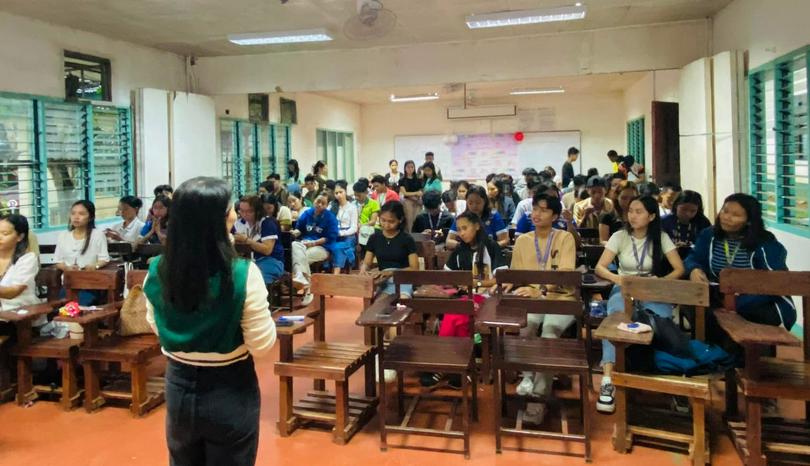Ms. Glendz, a staff worker of Caraga Regional UNit, Inter-Varsity Christian Fellowship (IVCF) Philippines, recently attended the 12th Christian Forum for Reconciliation in Northeast Asia in Japan. During the event, she accepted an exclusive interview with China Christian Daily, where she shared her mission journey, witnessed God's grace in ministry, and voiced her concerns about church development in the Philippines.
IVCF Philippines is a national movement that traces its roots to Cambridge University in 1877, where a group of students united for evangelical witness. The movement reached the Philippines in 1953 and is now part of the International Fellowship of Evangelical Students (IFES).
IVCF Philippines is a non-denominational, non-governmental organization. It is a Christ-centered community of Filipino students and graduates committed to extending God's kingdom worldwide. Their mission is to disciple students and graduates for Christ in all areas of life to serve campuses, churches, and communities.
Glendz comes from a tribal family that traditionally worshipped nature gods. She began to know Jesus Christ and accepted him as her Lord and Savior during her first year of college, on September 5, 2006, through IVCF's campus ministry. She was later trained as a student leader.
After graduation, she went through eight different jobs before becoming a full-time minister. At the time, she was working in Manila and attending a church focused on student ministry. When students began bringing their parents to church, the young pastor asked Glendz to engage with the parents. Through this experience, Glendz received a calling from the Lord to become a full-time community missionary.
"I wasn't qualified," she said, "but God enabled me." Though she wasn't a parent, she was called to minister to families. Over time, the number of parents she served grew from eight to sixty.
She shared stories of having no permanent home to stay in and financial challenges, recalling how her monthly allowance was only $95. Occasionally, she only had enough for a one-way trip to the community. But she still went, trusting in God's provision, and someone unexpectedly provided for her.
She also witnessed God answering prayers through her obedience. In one instance, God led her to bring food to a family before a home visit, even though she had only 200 Philippine pesos (around $3.5). The woman cried, saying it was an answer to her prayer.
In her moments of discouragement, Glendz asked God why she couldn't disciple wealthy or problem-free people. God reminded her that He came for the sick. That message comforted her and reaffirmed her calling. Many of the parents she discipled experienced transformation: some enrolled in seminaries, some began discipling others, and one even became a full-time church worker.
Glendz emphasized the importance of contextual ministry specifically tailored for discipling parents. She would visit their homes, build relationships, and pray with them. Gradually, they would come to realize their deeper need for Jesus.
One testimony she shared involved a woman whose husband was unfaithful. Glendz prayed for them, and the husband later called to ask for forgiveness. The couple reconciled and later brought another woman with a similar issue into the fellowship. Also, through praying for the sick, helping the parents to strengthen their relationship in Christ through prayers, meditating on God's word, and other spiritual disciplines, God continued to grow the fellowship.
Glendz once thought she would remain in that mission field for good, since God had been doing things mightily there. But He gave her a new direction during her quiet time. Inspired by Luke 4:42-43, when people in Capernaum want to keep Jesus because he performed miracles, Jesus says he must go to other towns to preach the beneficial news. She knew it was time to move on.
Then, in 2017, she started to work as a volunteer and became a campus missionary with IVCF in 2018. Today, IVCF Philippines has 45 staff workers serving 59 high schools and 109 colleges and universities, three international student ministries, and one Nurses Christian Fellowship. In the Caraga region, where Glendz works, there are three staff members and two volunteers covering 22 campuses. She personally oversees ministry in 10 of those campuses—one college and nine high schools.
Her campus ministry began with one college and an invitation to the high school campus. Someone at one high school invited her to start a campus ministry there. When teachers and students from that school transferred to others, they brought the news of campus ministry. Then the ministry extended to other campuses.
To connect with students, Glendz identifies their felt needs—whether related to mental health, emotional issues, or poverty—and builds trust through relationships. As students observe the lives of the leaders, staff, and graduates and experience a sense of belonging, prayer, and care within the community, many come to surrender their lives to Jesus. Holistic discipleship subsequently guides students in nurturing their relationship with God through spiritual practices such as prayer and quiet time, while also encouraging them to honor the Lord in their studies and all their endeavors. Students who are equipped choose to engage with and contribute to a church, their campus, family, and community.
Despite having limited resources, they braved rainy and rough roads on motorcycles to spread hope to distant campuses. And throughout the pandemic, internet access was a major barrier in connecting with the students in their region. But the mission did not stop there; staff and volunteers visited the barangays where their campuses were situated, gathered the neighboring students in a single location while adhering to protocols, and continued to educate and empower the students. With the return of face-to-face classes, numbers of students transitioned into active participants and began to take charge of the campus ministry at their respective institutions.
It's powerful to journey with students and allow them to witness God's work, Glendz said, and they catch it by living and serving together. A number of the IVCF Philippines staff workers hail from Caraga, drawn by a clear sense of God's calling. She added that by saying yes to the Lord, uncertainties will be embraced, transformation will be experienced, and purpose within God's grand design will be discovered.
In reflecting on the church in the Philippines, Glendz pointed out three significant challenges: political division among Christians, the spread of the prosperity gospel, and the lack of sound biblical theology—especially in remote areas where teachings can be misinterpreted. She called for prayer: for unity, for churches to place their hope in God, and for wisdom and discernment among Christian leaders.
At the reconciliation forum in Japan, she learned the value of dialogue and peacebuilding. While Christians in the Philippines often avoid discussing political conflict to prevent hurt and fighting, she realized the importance of facing such issues and praying for them.
She also shared a prayer for the church in China: that believers would not forget their first love, would have the strength to resist sin, and would grow in wisdom, repentance, and perseverance, and that they would be found faithful until the Lord returns.
(Ms. Glendz is a pseudonym.)












